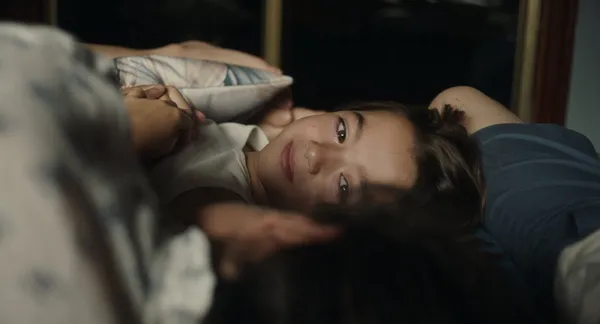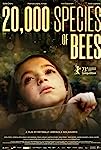Eye For Film >> Movies >> 20,000 Species Of Bees (2023) Film Review
20,000 Species Of Bees
Reviewed by: Jennie Kermode

Embarrassment at going swimming; not wanting to share a bed with a brother; depression accompanied by an unwillingness to open up, even within a loving family. To some viewers, these things will be instantly familiar, but the truth is that they can have a number of causes, and often adults busy with their own stresses and trying to juggle numerous different responsibilities just can’t put the pieces together. Children struggle to express what they don’t have words for. The eight-year-old protagonist of this film (played by Sophía Otero), who at one point claims to have no name, is going through a complicated journey, trying to figure it out unaided with only intense feelings and small scraps of information to go on.
“Don’t call me Cocó!” she shouts in the back of the car, but really it’s a name which she’s more comfortable with than Aitor, the one the adults use, and she is the term which she uses for herself inside her own head, even though she knows that the adults think she’s a boy. She’s confused, of course – it’s a confusing situation – but perhaps not in the ways that others think. Part of the reason that she has had to deal with it alone for so long is that her mother Ane (Patricia López Arnaiz) does love her and tries to be accepting, letting her have long hair because it’s beautiful, telling her that when it comes to toys there are no boy things and girl things. This may make it easier to cope at home but as she gets older and increasingly has to deal with the wider world, it’s harder and harder to cope with others’ assertions about who she is, or to escape gendered expectations and categorisation.
Estibaliz Urresola Solaguren’s immersive drama begins with the arrival of the child, her mother and siblings at the home of her grandmother Lita (Itziar Lazkano) in a small Basque village. The bees of the title dwell there, in hives high up in the hills, and she’s instantly attracted to them, but they have only a small presence in a busy story. There’s always something happening, and the child’s lack of agency is emphasised by the abrupt way she moves from one place to another, conversations happening literally over her head, other people coming and going and always seeming to know why as she struggles to define a sense of purpose. When she does achieve small victories, such as befriending and blending in with a new group of girls, some adult always comes barging it, clumsily saying the wrong thing, and ruins it. They don’t know what’s happened and she doesn’t know how she can continue to cope.
Otero, who is in almost every scene, carries the film with her fresh and naturalistic performance, which is perfectly complemented by Solaguren’s impressionistic style. There’s a lot more going on, however, which her own struggle makes her blind to: the shaky state of her parents’ marriage, Ane’s struggle to make a living as a sculptor, the tension between Ane and Lita over romantic and career decisions. A fresh crisis could make or break this already fractured family. Only the child’s great aunt Lourdes (Ane Gabarain), the beekeeper, finds time to patiently observe and listen to her, setting out to try and build up her confidence and help her find her own path.
It’s a heavily female-centred film, with men on the outskirts looking to the women to tell them what they ought to think. At one point it is suggested that the child’s behaviour stems from spending her time surrounded by women, which might be more convincing if she weren’t constantly trying to get away and be on her own. The bond which she gradually forms with her brother Eneko (Unax Hayden) shows us that she relates more to him than to any adult. They’re both at the stage of adapting to the world as they find it rather than trying to interpret it through established rules, and it’s this that gives the film its rich sense of possibility.
Although we see almost everything from the child’s point of view, many older viewers will relate to the distress experienced by adults who can see that they’re upsetting her but don’t know what they’re doing wrong. The way this is developed feels a little rushed in the final scenes, but still believable. Refreshingly, trans experiences are not treated, here, as something out of the ordinary. All this child really needs is to be heard and respected, like any other, and recognised as an independent entity who won’t always fit her family’s expectations – but simple truths can get lost when everybody is focused on trying to please or impress or make sense of everybody else, and at times the deep love evident in this family seems to be working against it.
A beautifully realised piece of work, this is far more than just an issue film. It made a splash at Inside Out 2023, and it’s well worth tracking down.
Reviewed on: 02 Jun 2023

















